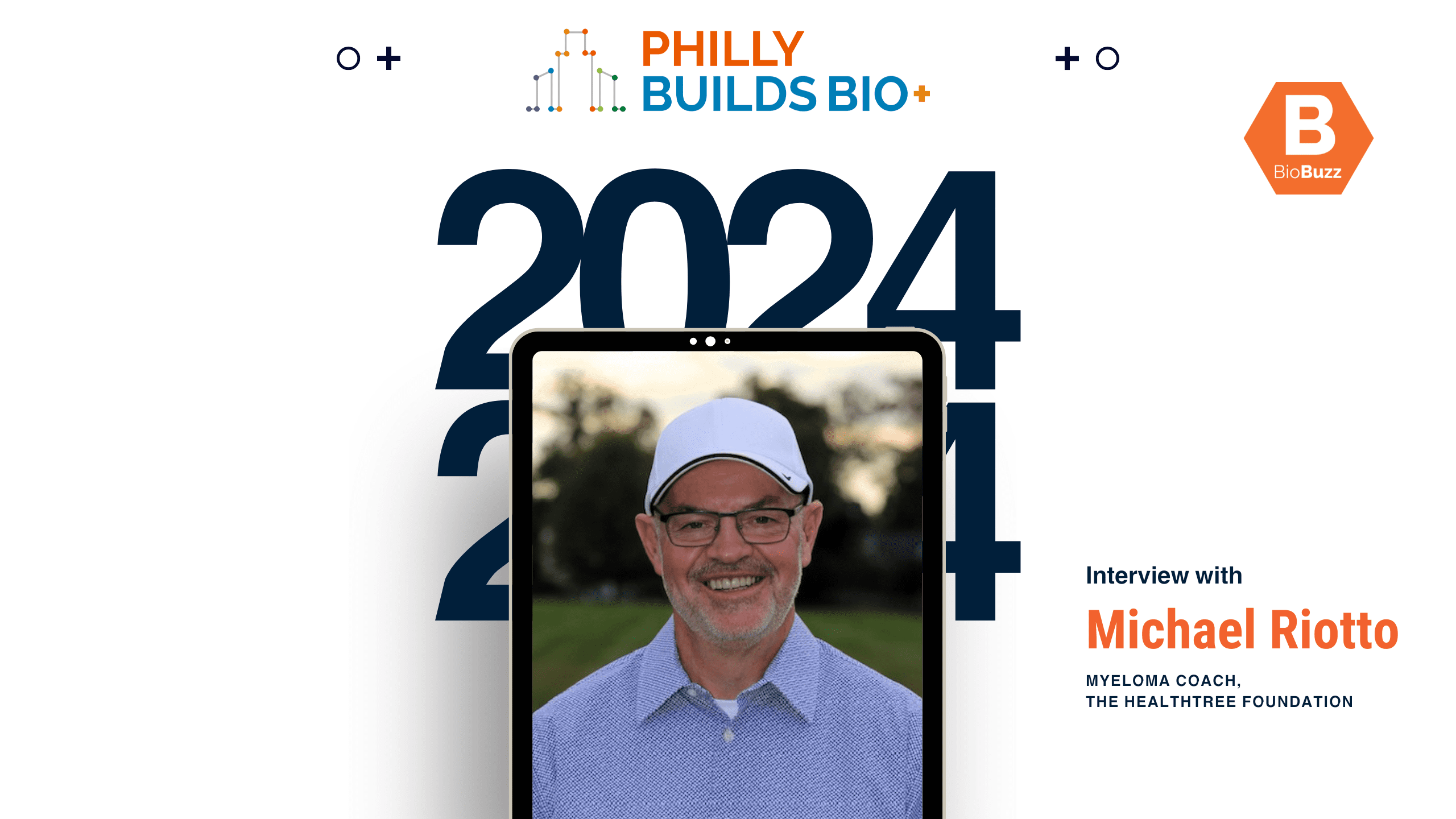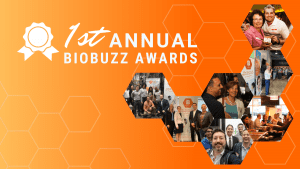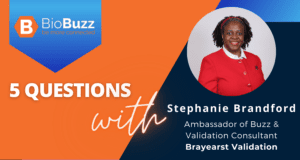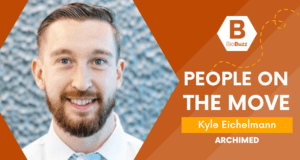
In Conversation with Michael Riotto, Myeloma Coach, The HealthTree Foundation
BioBuzz‘s CEO, Chris Frew, interviewed Michael Riotto, Myeloma Coach at The HealthTree Foundation, at the Philly Builds Bio 3rd Annual Symposium. Michael, diagnosed with multiple myeloma at 51, has become a dedicated advocate and coach, using his personal journey through chemotherapy, a stem cell transplant, and continuous maintenance therapy to support and guide fellow myeloma patients.
November 14, 2024
| This article is part of our In Conversation series, one of our ongoing People & Places Features. Go indepth with some of the most interesting people making impact across BioBuzz’s growing biohubs. |
Chris Frew [00:00:05]:
Welcome, I’m Chris Frew, CEO of BioBuzz Networks. I’m thrilled to be here at Philly Builds Bio 3rd Annual Life Science Symposium. We’re here where hundreds of attendees and over 50 panelists have come together to talk about innovation in the life science industry and specifically what’s happening in greater Philadelphia. I’m honored to be here with Michael Rioto. Michael, thanks for joining me.
Michael Riotto [00:00:26]:
Good morning. Thank you for having me.
Chris Frew [00:00:28]:
My pleasure. Would you mind giving a quick introduction to yourself?
Michael Riotto [00:00:32]:
Quick introduction. I live right outside of Philadelphia in Warwick Township, married to a wonderful wife of 36 years, two grown children, and I live with multiple myeloma and incurable blood cancer for the last 13 years.
Chris Frew [00:00:45]:
And, and tell me about the organization you’re part of.
Michael Riotto [00:00:47]:
I’m part of the HealthTree organization. I’m one of their coaches and I’m of intricately involved with everything that they do, like being here today.
Chris Frew [00:00:56]:
Michael, can you share a little bit about your journey as a patient advocate and kind of how that brought you to becoming a my coach?
Michael Riotto [00:01:04]:
Wow. How much time do we have? It all started way back when I was diagnosed in 2011 and roughly about 2013, I got involved with an organization to do peer to peer education and educate other patients about myeloma and stem cell transplant. And that led into to me being a coach for the health trade organization. And right now I have what we call coaches. I have 13 coaches. I had as many as 23 at one time and I kind of helped them. You know, I wish there was a coach program when I was first diagnosed because, you know, the doctors and the nurses are wonderful and they’re terrific. But having that one on one conversation, if someone’s been through what you’re going to go through, makes all the difference in the world. And then when you talk about advocacy a little bit, there’s both, there’s two different kinds in my world. It’s self advocacy and it’s, you know, speaking up for yourself. And if your doctor’s not great, you fire your doctor and you find somebody new that’s gonna take care of you. And there’s also, what I, what I work on extensively now is legislative advocacy and advocating for better access and affordability and research dollars for all patients.
Chris Frew [00:02:07]:
Yeah, well, I’m sure as a coach, I know it’s, you know, going through any type of health scare and condition is challenging. Having someone else there that can help you along the journey is critical.
Michael Riotto [00:02:18]:
It’s immensely beneficial. You know, a little, little thing like taking a medicine, you know, there’s one particular med that I was taking and I was taking every morning. And I finally started to talk to somebody when I met at a conference, and they’re like, why you take it in the morning? And I said, that’s what I was told. And, you know, it made you groggy and sleepy all the time. And they’re like, take it at night. Ask your doctor to take it at night. And so I switched to taking it at night. But the doc never tells you those things. But then you learn out, hey, I slept much better.
Chris Frew [00:02:45]:
Yeah, well, so you talk about advocacy as well. And we’re here today at Philly Builds Bio, which is a gathering of industry leaders and academic leaders. Why is it important to be engaging for you and your organization to be engaging with this community as well?
Michael Riotto [00:03:02]:
Probably a couple different reasons, but I think it’s important for all the organizations in the biotech industry to realize that what they do may help me. You know, I’m going to tell my story a little bit about my history, a little bit about my illness, and just to remind them that I’m the end result. You know, what they develop in the lab or what they develop on a computer might help me in the end. The other thing is too, is we need to work on access and affordability. You know, it’s great and it’s wonderful. I’m lucky. I live right outside of Philadelphia. There’s all these great institutions right here, you know, up Jefferson, fox chase. But 80% of the folks in rural areas or they’re an underserved area, they don’t have access. You know, we look at the latest, you know, cellular technology like Car-T, which is great. There’s only 76 centers in the United States that can actually administer that treatment for myeloma. That’s kind of scary. So if you’re in Idaho, guess what? You gotta travel hours, four hours, six hours before you can get that treatment. So working on access and affordability is big mission.
Chris Frew [00:04:10]:
Yeah, that’s a big topic point all across the industry and continues to be. And I think it’s important to have people part of that discussion. Can you talk about some of the success stories of Health Tree and working with Health Tree and how that is improving outcomes?
Michael Riotto [00:04:28]:
HealthTree is a really unique organization because they have community, you know, they have education. They have an incredible, you know, web bank of all kinds of videos. They have an incredible coach program which I’m really super glad to be a part of. There’s over 200, 200 coaches right now. They also have what they call cure hub. And it’s a huge, gigantic database where it gathers patient information and literally it enables a doctor to be able to say, hey, I’m looking for this particular drug, this particular age, this particular sex. Can you help me pull it out? And they can mine that data relatively fast because it’s already in their bank and they can get an answer and it may predict a treatment. And that’s the coolest thing. So say, for example, you’re diagnosed with this stage and this old and you have this core mobility. They can go back and look at all the folks that are in the database and the doctor can actually say, hey, I think this treatment might work for you best. That’s pretty, pretty. How should we put that? Remarkable.
Chris Frew [00:05:36]:
It is remarkable. And I can imagine how many lives have been changed because people have access to that information ahead of time.
Michael Riotto [00:05:42]:
Yes.
Chris Frew [00:05:44]:
What you know, as a coach, I know the advocacy around working with patients is, I can imagine it’s very important to you. So, so what when you, if you’re talking to someone new, I’m sure you, there’s a lot, you get a lot of advice you can give them. But what advice would you give someone who is starting to go through their, their, their journey and to advocate for themselves?
Michael Riotto [00:06:05]:
I think the most important thing that we talk about, but when we do is one word. Hope. You know, when I was first diagnosed, they gave me roughly three months to live. I made it through the three months and they said, you know what? We might make it to three years. I’m at 13 years now. I’m beating the odds. Most myeloma patients don’t make it that long. So I think the first word that we always talk about is hope. Having a positive attitude and really work on self advocacy. Many people are so afraid, as I mentioned a few minutes ago, of firing their doctor. If your doctor is not going to answer your questions or give you the time that you need, you need to find somebody who will because they’re out there. You know, my doc at up man, I love the guy and I always warn him every time I go see him. Now I say, if you ever think about moving, retiring, I need to know years in advance because I want to be able to make sure I can follow you and take, and, you know, make sure I’m taking care of myself. But I think that’s, that’s the most important piece of advice. Number one, is to have hope and a positive outlook. And number two, speak up for what you want because it can make a difference. Yeah.
Chris Frew [00:07:13]:
And as we wrap up here. I’d love for you to kind of share. Also, if you’re speaking to a biotech company or an entrepreneur is working on a new, new disease or new what message do you have for that?
Michael Riotto [00:07:28]:
Always put the patient first. Always remember that everything that you work on is for the patient. And I think that’s, that’s the bottom line.
Chris Frew [00:07:39]:
Well, that’s great. It’s a great message. Michael, thank you for joining me today. Thank you for everything that you do.
Michael Riotto [00:07:43]:
Thank you. My pleasure.
Chris Frew [00:07:45]:
My name is Chris Frew. I’m the CEO of BioBuzz Networks. We’re here live today at Philly Builds Bio.
- About the Author
- Latest Posts
BioBuzz is a community led, experience focused, biotech and life sciences media and events company. BioBuzz highlights regional breaking news, industry professionals, jobs, events, and resources for business and career growth. Their weekly newsletter is subscribed to by thousands in the BioHealth Capital Region and Greater Philadelphia as the go-to for industry updates.






